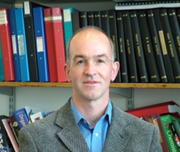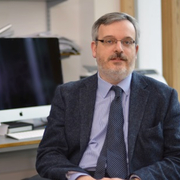- Level Foundation
- المدة 12 ساعات hours
- الطبع بواسطة University of Manchester
-
Offered by

عن
Fossil fuels have been the primary energy source for society since the Industrial Revolution. They provide the raw material for the manufacture of many everyday products that we take for granted, including pharmaceuticals, food and drink, materials, plastics and personal care. As the 21st century progresses we need solutions for the manufacture of chemicals that are smarter, more predictable and more sustainable. Industrial biotechnology is changing how we manufacture chemicals and materials, as well as providing us with a source of renewable energy. It is at the core of sustainable manufacturing processes and an attractive alternative to traditional manufacturing technologies to commercially advance and transform priority industrial sectors yielding more and more viable solutions for our environment in the form of new chemicals, new materials and bioenergy. This course will cover the key enabling technologies that underpin biotechnology research including enzyme discovery and engineering, systems and synthetic biology and biochemical and process engineering. Much of this material will be delivered through lectures to ensure that you have a solid foundation in these key areas. We will also consider the wider issues involved in sustainable manufacturing including responsible research innovation and bioethics. In the second part of the course we will look at how these technologies translate into real world applications which benefit society and impact our everyday lives. This will include input from our industry stakeholders and collaborators working in the pharmaceutical, chemicals and biofuels industries. By the end of this course you will be able to: 1. Understand enzymatic function and catalysis. 2. Explain the technologies and methodologies underpinning systems and synthetic biology. 3. Explain the diversity of synthetic biology application and discuss the different ethical and regulatory/governance challenges involved in this research. 4. Understand the principles and role of bioprocessing and biochemical engineering in industrial biotechnology. 5. Have an informed discussion of the key enabling technologies underpinning research in industrial biotechnology 6. Give examples of industrial biotechnology products and processes and their application in healthcare, agriculture, fine chemicals, energy and the environment.الوحدات
Introduction
1
Videos
- Welcome to Industrial Biotechnology
1
Readings
- Pre Course Survey and Course Credits
Lectures
7
Videos
- Introduction from Nigel Scrutton
- Overview and introduction
- How do enzymes work?
- How do we discover enzymes for application in biotechnology?
- How can we study and characterise the catalytic activity of enzymes?
- Engineering Enzymes I: Directed Evolution
- Engineering Enzymes II: Rational Design of Biocatalysts
Supplementary materials
1
Readings
- Glossary
Assessment
1
Assignment
- Enzymes, Enzyme Discovery and Engineering
Introduction
1
Videos
- Introduction from Rainer Breiting
Lectures
8
Videos
- Introduction to Synthetic Biology: Visions for Biotechnology 2.0
- Designing biological systems: Computational modelling and systems biology
- Building biological systems I: Genome synthesis and genome editing
- Controlling and engineering pathways in Synthetic Biology
- Testing Biological Systems Biological debugging using metabolomics
- Deploying biological systems: Perspectives on Responsible Research & Innovation and bioethics I
- Deploying biological systems: Perspectives on Responsible Research & Innovation and bioethics II
- Conclusions and Outlook Systems and Synthetic Biology
Supplementary material
2
Readings
- Glossary
- Systems and Synthetic Biology
Assessment
1
Assignment
- Methods in Systems and Synthetic Biology
Introduction
2
Videos
- Introduction from James Winterburn
- Introduction from James Lawrence and Michael Sulu
Lectures
6
Videos
- Introduction to Biochemical and Bioprocess Engineering
- Microbial fermentation processes and bioreactor design
- Biocatalysis and enzymatic processes
- Recovery and purification of small molecules
- Recovery and purification of large molecules
- Process economics and scale-up
Assessment
1
Assignment
- Biochemical and Bioprocess Engineering
Introduction
1
Videos
- Introduction from Nick Turner and Andy Wells
1
Readings
- CHEM21
Lectures
6
Videos
- Industrial Example 1: Hydrolases
- Industrial Example 2: Transaminase
- Industrial Example 3: DERA Aldolase
- Industrial Example 4: Alcohol Dehydrogenases
- Industrial Example 5: Nitrile Hydratases
- Industrial Example 6: Amino Acid Oxidases
Supplementary material
1
Readings
- References and Further Reading
Assessment
1
Assignment
- Pharmaceuticals and Fine Chemicals
Introduction
1
Videos
- Introduction from David Leys
Lectures
6
Videos
- The challenges of sustainable bioenergy development
- New routes to biofuel production
- Membrane processes in industrial biotechnology
- Enzymatic biofuel cells
- Biomaterials: engineering cell niches hydrogels
- Biomanufacturing
Supplementary material
2
Readings
- Reading List
- Glossary
Assessment
1
Assignment
- Case Studies: Bioenergy and Biomaterials
Introduction
2
Videos
- Introduction from Sabine Flitsch
- Introduction from Alan Dickson
Lectures
6
Videos
- Introduction to glycoscience
- Glycoscience: pharmaceuticals & personalised medicines
- Glycoscience: other applications
- Biopharmaceuticals: the clinical significance
- Biopharmaceuticals: the technical stuff
- Biopharmaceuticals: the industrial perspective
Assessment
1
Assignment
- Glycoscience
Auto Summary
Explore the transformative world of Industrial Biotechnology with Coursera's foundational course in Science & Engineering, led by expert instructors. Delve into sustainable manufacturing processes, enzyme discovery, synthetic biology, and bioethics. This 720-minute course offers both Starter and Professional subscription options, making it ideal for anyone interested in the future of eco-friendly industrial practices. Enhance your knowledge and impact the world with innovative solutions in healthcare, agriculture, and energy.

Prof. Nicholas Turner

Prof. Nigel Scrutton

Dr. Nick Weise

